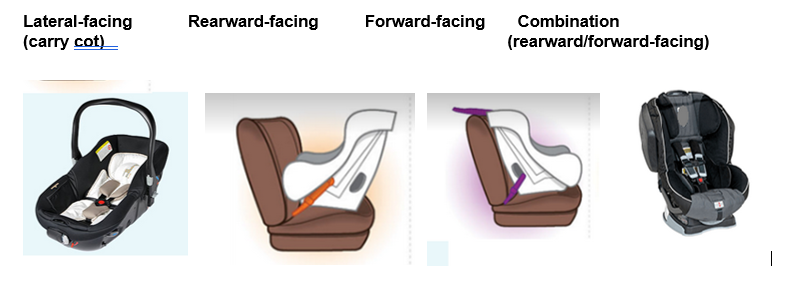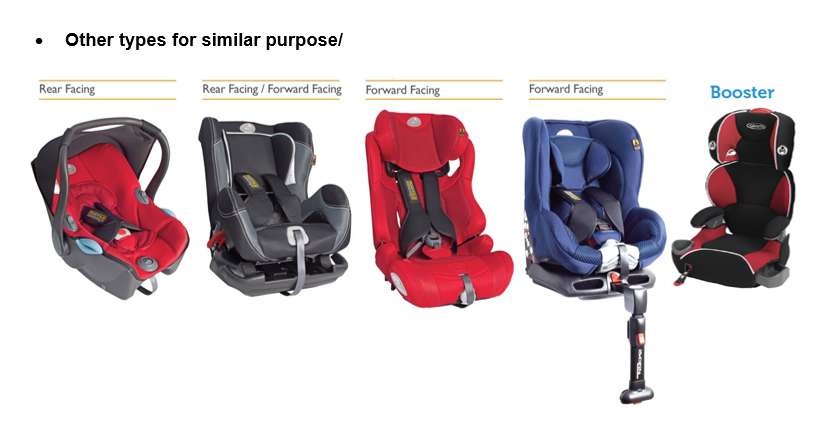Pursuant to Section 6 of Republic Act (RA) 11229 or the “Child Safety in Motor Vehicles Act” and the Department Administrative Order (DAO) 20-03, series of 2020, the DTI-BPS has included Child Restraint System (CRS) in the list of products for mandatory certification. All manufacturers and importers of CRS are now required to secure a Philippine Standard (PS) license or an Import Commodity Clearance (ICC) certificate prior to marketing, sale and distribution. Child Restraint System is a device capable of accommodating a child occupant in a sitting or supine position. It is also designed as to diminish the risk of injury to the wearer, in the event of a collision or of abrupt deceleration of the vehicle, by limiting the mobility of the child’s body.
The DAO 20-03, series of 2020 covers six (6) types of CRS:
- Lateral-facing (carry-cot) - a restraint system intended to accommodate and restrain the child in a supine or prone position with the child's spine perpendicular to the median longitudinal plane of the vehicle or a CRS facing perpendicular to the normal direction of travel of the vehicle.
- Rearward-facing - facing in the direction opposite to the normal direction of travel of the vehicle
- Forward-facing - facing in the normal direction of travel of the vehicle
- Combination (rearward/forward-facing) – a CRS which can be used in either normal or opposite to normal direction of travel of the vehicle.
- Booster cushion/seat - a firm cushion, which can be used in conjunction with an adult seat belt, which pass around the body of the child or restraints the device in which the child is placed, forming a complete CRS


The PS Safety Certification Mark Licensing Scheme shall be available for both local and foreign manufacturers selling or distributing CRS in the Philippine market. The license to use the PS Certification Mark shall be granted to a company found to be compliant with the requirements of the BPS. Regular surveillance activities shall be conducted including factory and product audits. The PS license shall be effective from the date of issuance and in full force and effect for a period of three (3) years, subject to annual surveillance audit. PS license can be suspended, withdrawn or cancelled for cause, at any time and after due process. All imported CRS covered by a valid PS license shall apply for a Statement of Confirmation (SOC) on a per shipment, per Bill of Lading/Airway Bill basis to ensure that the imported products came from a valid PS license holder.
Meanwhile, for non-PS certified CRS, the importer shall apply for Import Commodity Clearance (ICC) on a per shipment, per Bill of Lading/Airway Bill basis subject to verification and inspection.
To verify the conformance to the testing requirements, the test methods prescribed by PNS UNR 44:2018 or PNS UNR 129:2018, as applicable, shall be used. In the absence of a BPS-recognized testing laboratory, the PS license holders/applicants or importers shall nominate a testing laboratory accredited by an accreditation body signatory to ILAC/APAC to conduct the product testing.
With the issuance of the DAO 20-03, series of 2020, the required markings and information shall be as follows:
- On Child Restraint Systems
- Manufacturer’s name, initials, or trademark
- Year of Production
- Instructions for Correct Installation and Use (appropriate pictograms/symbols, correct webbing path, configuration, etc.)
- Country of Origin
- Serial/Batch Number
- PS License Mark or ICC Sticker
- On Packaging
- Trade name or brand name
- Duly registered trademark
- Duly registered business name and address of manufacturer and importer (if imported) or duly registered business name and address of manufacturer (if locally manufactured)
Transitory Provision
Based on Rule 26 of RA 11229, all brand-new CRS imported in to the Philippines prior to the effectivity of the DAO 20-03, series of 2020, and currently in the possession of the importers, distributors, or retailers may be certified by the BPS within 12 months from the effectivity of the order.
“The DTI-BPS aims to ensure that CRS purchased in the market meets the specified safety requirements by requiring all manufacturers and importers to secure the Philippine Standard (PS) Safety Certification Mark License or the Import Commodity Clearance (ICC) certificate prior to selling in the market.” DTI-BPS Director Neil P. Catajay emphasized.
The list of the approved CRS, the DAO No. 20-03, series of 2020 and other issuances may be downloaded from the BPS Standards and Conformance portal, www.bps.dti.gov.ph. Direct link to BPS’ issuances can be accessed through https://bit.ly/BPSissuances.
For more updates and information on standards, technical regulations, and conformity assessment procedures (STRACAP), please visit the DTI – BPS portal: www.bps.dti.gov.ph. Emails and messages may also be sent to our official Facebook page “DTI Bureau of Philippine Standards” or through This email address is being protected from spambots. You need JavaScript enabled to view it..
